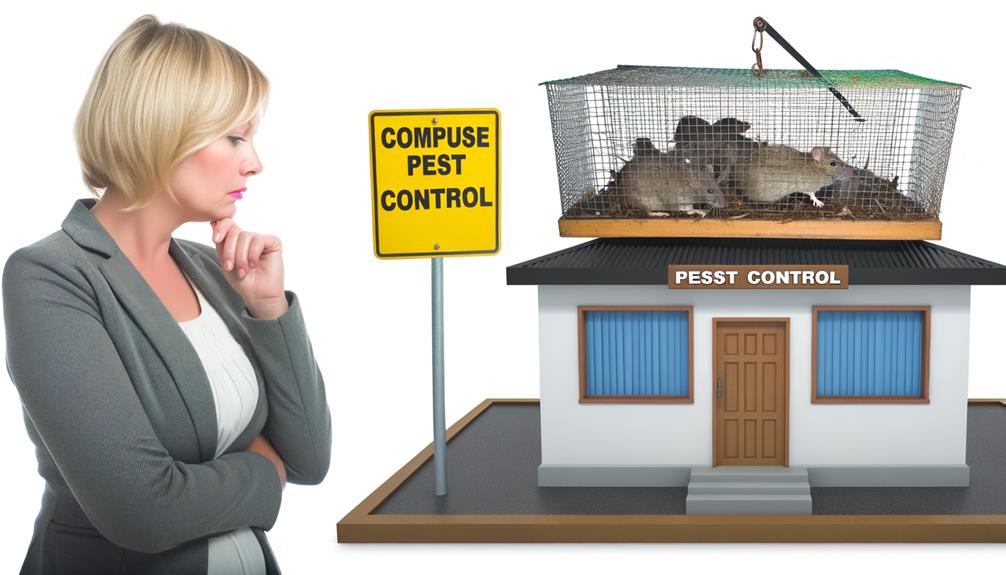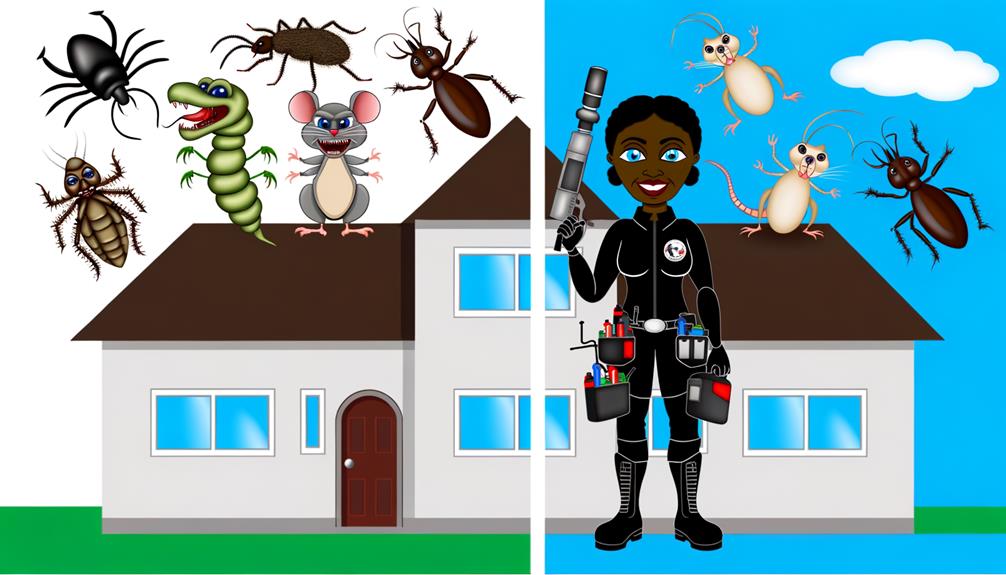Table of Contents
It might seem like you’d need a treasure chest to afford getting rid of rats if you’re relying on your council’s services. Yet, councils in London offer a variety of pest control solutions, often at a subsidized cost, but not for free.
You’re probably wondering how much you’ll have to fork out and what factors influence these charges. Whether you’re a homeowner or a tenant, understanding these costs is crucial.
Bear with me as we navigate the labyrinth of council charges, and you might just find ways to manage these unwelcome guests without breaking the bank.
Key Takeaways
- Councils may charge fees for rat removal, varying by property size and infestation severity.
- Some residents may qualify for free or discounted rat removal services based on their financial situation.
- Comparatively, professional pest control services might offer more personalized solutions, potentially at a higher cost.
- Understanding eligibility for council-provided services can lead to cost-effective rat removal solutions.
Understanding Council Charges To Get Rid Of Rats

Councils’ approach to rat removal charges varies widely, so it’s crucial to understand how your local authority calculates these fees. The cost factors influencing this can range from the size of your property to the severity of the infestation. It’s a complex equation that considers the resources needed to effectively tackle your rat problem. Additionally, eligibility for free or subsidized services plays a significant role. Some councils generously offer these benefits to residents who meet certain criteria, providing much-needed relief for those in tight financial situations.
When weighing your options between council and private services, it’s essential to grasp the differences in cost, effectiveness, and availability. Council services might come at a lower price or even for free if you’re eligible. On the other hand, private services, while potentially more expensive, can offer quicker responses and specialized treatments. It’s a balance between cost-efficiency and immediate needs, and understanding your local council’s charges and eligibility criteria is the first step in making an informed decision on how to best address your rat issue.
Council Pest Control Services

In many London areas, you’ll find that local authorities provide pest control services, targeting rats among other common pests, with costs that may vary depending on the nature of your infestation. These services are designed not just for eradication but also for pest prevention, ensuring your home remains free from unwelcome visitors. It’s important to remember that while pricing can differ vastly between boroughs, the commitment to maintaining public health and safety remains a constant priority.
You might wonder if you’re eligible for free or discounted services. Many councils offer these based on circumstances such as income, age, or disability, making pest control accessible to everyone in the community.
Moreover, councils typically have a standard flat rate for callouts, which includes dealing with rat infestations. This straightforward approach simplifies the process, allowing you to focus on the solution rather than the cost. For those inclined towards a more hands-on approach, councils often provide advice and resources on DIY solutions. These can be an effective first step in pest prevention, empowering you to protect your home proactively.
Comparing Costs: Council Vs Professional

While exploring options for rat removal, it’s crucial to compare the costs and services offered by local councils to those provided by professional pest control companies. A thorough cost analysis reveals that councils might charge varying rates depending on the infestation’s severity and property type. However, you should remember that service quality can significantly differ. Professional pest control services, especially in areas like London, are known for their more detailed and personalized approaches to tackling rat problems.
Comparing costs, you’ll find that council fees can vary widely, and in some cases, residents qualifying for certain benefits might access these services at a discounted rate or even for free. This consideration is vital for anyone needing to balance budget constraints with the need for effective rat removal.
On the other hand, while professional services might appear more expensive up front, their comprehensive solutions often offer better value in the long run. Deciding between council services and professional pest control isn’t just about the initial cost; it’s about considering the long-term effectiveness and quality of service. By weighing these factors, you’ll find the most cost-effective and efficient solution for your rat infestation.
Rat Control Responsibilities: Tenants and Landlords

Navigating the murky waters of rat infestation responsibilities between tenants and landlords requires a clear understanding of local regulations and tenancy agreements. As a tenant, you must report any rat infestations to your landlord or the council swiftly. It’s not just about making a complaint; it’s about taking proactive steps to ensure your living environment remains healthy and safe.
On the flip side, landlords are tasked with a significant responsibility. They must make sure the property is fortified against rats and tackle any infestations head-on. If rats have turned your rental into their playground, your landlord should be your first call. Remember, council fees and the legal implications of ignoring such issues can be hefty. If the property is under your name and you’re dealing with rats, the council might send the bill your way.
It’s a shared journey, with both tenant obligations and landlord responsibilities playing pivotal roles. Whether it’s preventing an infestation or dealing with one, understanding who pays for what can be a bit of a maze. Tenancy agreements and local regulations are your maps through this terrain, outlining the financial burdens and actions required by both parties.
Saving Money on Pest Control
You can often save a significant amount of money on pest control by exploring council-offered services for dealing with rats. Many councils provide free or subsidized treatments, making them budget-friendly options for managing pest issues. To make the most of these services, it’s vital to understand the eligibility criteria, which may vary depending on factors like property ownership or whether you’re receiving certain benefits.
Moreover, residents in council properties might find they’ve higher priority for pest control services, offering further advantages. However, some councils may charge if no signs of pests are found during an inspection, so ensuring a legitimate concern before requesting service is key.
To save on costs, don’t overlook prevention tips that reduce the likelihood of rat infestations. Simple measures can significantly impact you, allowing you to maintain a pest-free environment without breaking the bank. By staying informed and utilizing these strategies, you’re protecting your home and fostering a sense of belonging within a community committed to shared well-being and support.
Conclusion
In conclusion, tackling rat infestations requires understanding council charges and comparing these with professional pest control fees. You’re responsible for discerning whether you’re a tenant or landlord, as this affects who bears the cost.
By exploring council services and weighing them against private options, you save money while ensuring a pest-free environment. Remember, effective pest management isn’t just about spending less; it’s about investing wisely in your health and property.
Choose wisely, act promptly, and live comfortably.
You may also enjoy reading this article
Was This Article Helpful?
- Please provide feedback and comments to help us improve our content.
- Share your experiences and any additional tips you have for dealing with pests.
Share this Post



